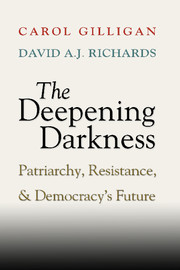Book contents
- Frontmatter
- Contents
- Acknowledgments
- Introduction and Overview
- Part One Roman Patriarchy: Entering the Darkness
- 1 Why Rome? Why Now?
- 2 Roman Patriarchy and Violence
- 3 Vergil on the Darkness Visible
- 4 Apuleius on Conversion
- 5 Augustine on Conversion
- Part Two Resistance Across Time and Culture
- Part Three Democracy's Future
- Conclusion
- Notes
- Bibliography
- Index
3 - Vergil on the Darkness Visible
Published online by Cambridge University Press: 01 September 2010
- Frontmatter
- Contents
- Acknowledgments
- Introduction and Overview
- Part One Roman Patriarchy: Entering the Darkness
- 1 Why Rome? Why Now?
- 2 Roman Patriarchy and Violence
- 3 Vergil on the Darkness Visible
- 4 Apuleius on Conversion
- 5 Augustine on Conversion
- Part Two Resistance Across Time and Culture
- Part Three Democracy's Future
- Conclusion
- Notes
- Bibliography
- Index
Summary
Vergil's Aeneid is often taken to be a self-consciously written apology for the form of Roman imperial power established by Augustus Caesar. As we observed, Octavian Caesar had defeated the forces of his erstwhile ally Mark Antony, allied with his lover and now wife, Cleopatra VII, ruler of Egypt. The very idea of a woman ruler was odious in patriarchal Rome, let alone a woman ruler known for her sexual powers not only over Antony but also over Julius Caesar himself, through whom Octavian claimed authority under Caesar's will. From this patriarchal Roman perspective, once Octavian triumphed over Antony and Cleopatra (adopting the name Augustus in 27 b.c.e.), Vergil's portrait of Dido, the ruler of Carthage, would have been reasonably construed as a portrait of Cleopatra.
Like Cleopatra, Dido rules a nation, Carthage, indeed a nation that was once Rome's greatest rival for supremacy over the Mediterranean and that came very close to defeating Rome in the three wars they fought. Dido, a widow, is also in Vergil's poem a sexual foreign woman who desires Aeneas, but one who struggles with her vow to her dead husband not to marry again or become involved sexually with a man. Despite her compunctions, Dido acts on her sexual desires and has an affair with Aeneas.
On both these scores – ruling as a woman and acting on sexual desire – Dido would, in the Roman mind, have counted as a bad woman, deviating from her natural place in the patriarchal order of things by acting on the authority of her own political and sexual voice, rather than the voice of her father or husband.
- Type
- Chapter
- Information
- The Deepening DarknessPatriarchy, Resistance, and Democracy's Future, pp. 53 - 81Publisher: Cambridge University PressPrint publication year: 2008



